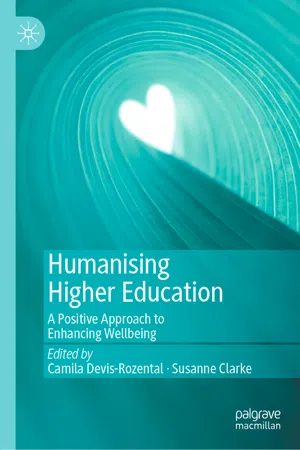1.1 Introduction and Rationale for This Book
Before we begin our journey to humanise higher education, we want to introduce ourselves so you can get a sense of who we are and what we do, but more importantly why we wanted to begin this quest. For the purpose of this chapter and to be clear about our own voices, we will refer to ourselves as Camila and Susanne when we are talking about our specific areas of research. The rest of the time we are a “we” as we collaborate in most areas of our work, developing and embedding a positive organisational culture through service excellence. This book has been a collective effort; we asked our friends, colleagues and experts who have inspired us along the way to join this venture and explore how, within their practice and or experience, they have applied, embedded, experienced or practised with a humanised approach.
We wanted to capture as many areas within a university so that you, the reader, gain an understanding of how all these theoretical ideologies can be lived, and how within the different lenses we present in this book, higher education can be humanised. By doing so, we believe, student and staff wellbeing benefit as we put each individual at the centre of what we do.
When we refer to our golden thread, we mean those themes, theories and ideas which are interwoven throughout the book and without which the book would not exist. The humanisation framework, practising with an embodied relational understanding, areas of positive psychology and socio-emotional intelligence all form the basis of this tapestry of ideas, case studies, reflections and theories emerging from many corners of higher education institutions.
1.2 Terminology Matters
When we first started researching and getting ready to put the call out for our book, we came across misunderstandings regarding the terminology we were using. So, before we begin our journey, we want to clarify some of these.
Humanism,
humanisation and humanitarianism are all words derived from the Latin word Homo (human being), then humanus (of a man) and later old French and Middle
English humaine. Although they are all concerned
with humanity and human nature, they differ somehow.
Humanising according
to Galvin and Todres (
2013, p. 10/11):
humanisation is to uphold a particular view or value of what it means to be human, and furthermore to find ways to act on this concern. Such concern also needs to be practically translated into the more experiential issues of what practices can make people feel more human.
It differs
from humanism which according
to Humanists UK (2020) refers to:
people who have believed that this life is the only life we have, that the universe is a natural phenomenon with no supernatural side, and that we can live ethical and fulfilling lives based on reason and humanity. They have trusted the scientific method, evidence, and reason to discover truths about the universe and have placed human welfare and happiness at the centre of their ethical decision making.
This is considerably different from humanising as it is a belief system. There is also the concept of humanitarianism which refers to the promotion of human welfare and assistance to each other. This last term is concerned with the action rather than the experiential aspect of what makes us feelhuman, which is something that humanising encompasses. This term, along with some of its theoretical concepts and applications, forms the basis of this book, all within the context of higher education.
Education is, or it should be, person-centred; it refers to acquiring knowledge and experience of any type to enrich our experience and help us understand the world around us. It is in this process of assisting learning that educators play a crucial role that goes beyond imparting knowledge or instructions. Consequently, a humanising focus where this is coherently championed at every level within the organisation and considering the external factors which will influence our practice such as policy, culture, politics and even the economy are all important. Ensuring that this focus is kept on humanising issues can be done by developing a common lexicon and an in-depth understanding of what makes us feel more human.
In Camila’s previous book (Devis-Rozental 2018), she talked about the need for higher education scholars, both students and staff, to develop their socio-emotional intelligence. This is because it is no longer acceptable to assume that academics are fonts of knowledge, and their role ends with their expertise. In an ever-changing landscape where students are increasingly arriving at university with complex needs, as well as higher levels of anxiety and other mental health stresses (Snape 2017), academics must have the knowledge to signpost or support their students, while protecting their own wellbeing and resilience.
In her research, Camila found that students feel they have a good experience at university when they develop meaningful and genuine working relationships with university staff (Devis-Rozental 2018). It is through this relationship that students learn many of the soft skills that they will be able to utilise once they finish their education and commence their working life. This is why it is essential to develop and role modelmodel/modelling behaviours that drive healthy working cultures that students will then go on to emulate in their working life. We r...
